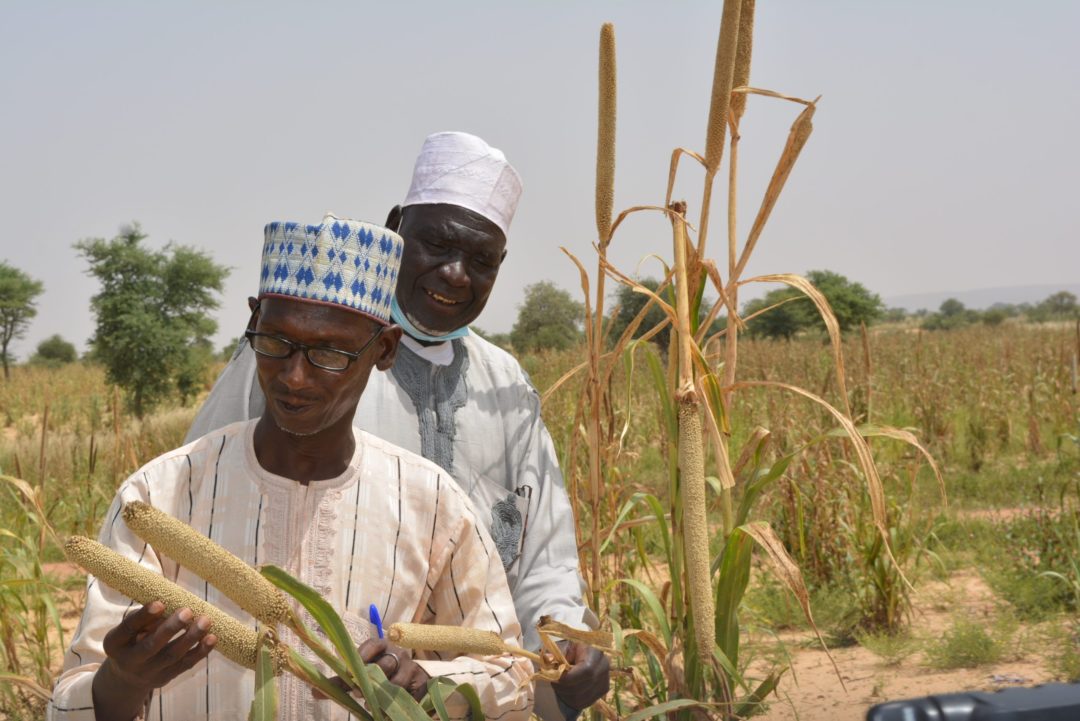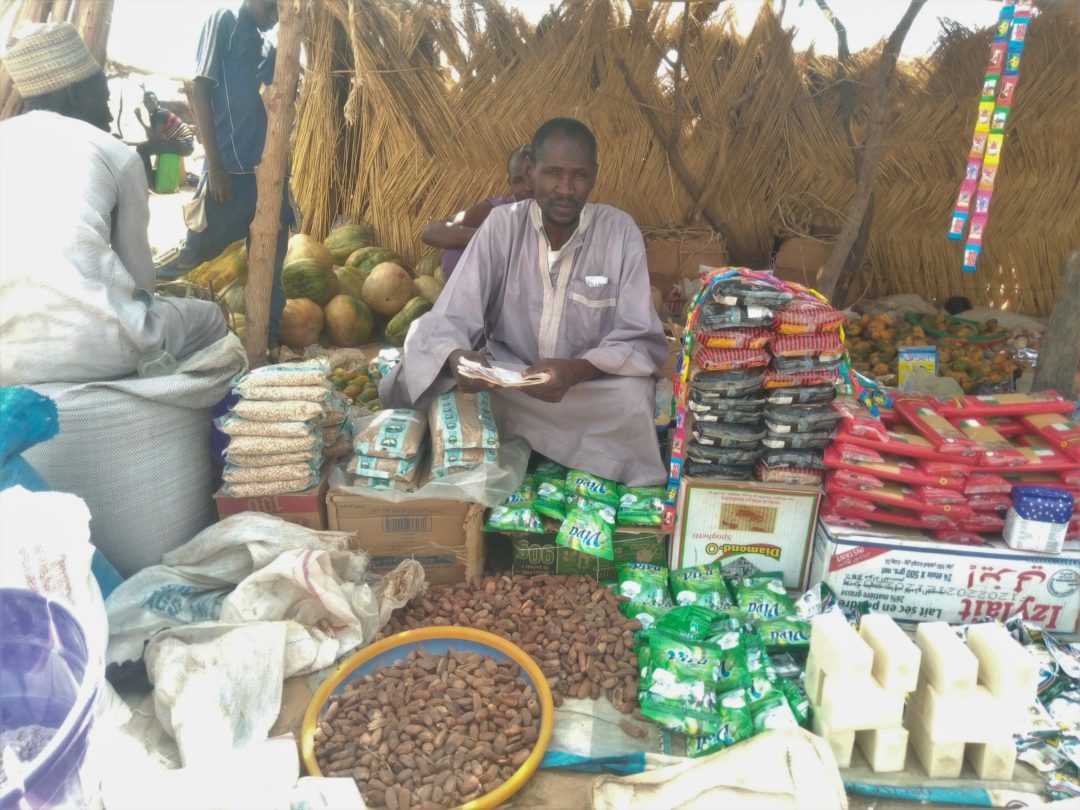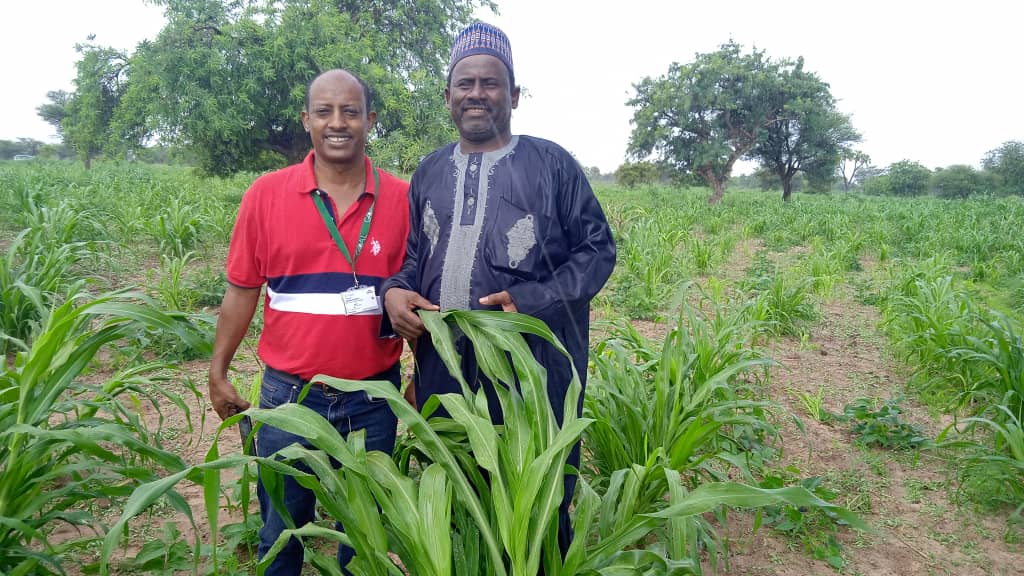 Stories
Stories
March 28, 2022 • 3 min read
For years Niger has been battling frequent droughts, conflict, and wide-spread poverty—a situation which has left many children stunted and suffering from chronic malnutrition.
According to the WFP, 42% of children under 5 are suffering from chronic malnutrition. 10.3% are acutely malnourished.
Agriculture is a key source of income for millions of people, contributing 40% to Niger’s gross domestic product (GDP). GOAL teams in Niger are working with local farmers, seed producers and traders to fight chronic malnutrition and poverty in the country.
With support from UNITLIFE, GOAL staff are working with participants in 20 villages across the Zinder region to promote innovative and sustainable agriculture. The project is combatting the effects of climate change, food insecurity and improving nutrition in local communities.
Supporting local families and businesses

Millet and bean producer Bachir Zabeirou (front) inspects his harvest with Elhadji Bachir Samouga also from Kantché, Zinder region.
As part of the programme, participants are trained on the production and benefits of modern seeds to raise nutrition consciousness, enhance food security, and support sustainable agricultural livelihoods.
The smart seeds have transformed local production. Local millet and bean farmer, Bachir Zabeirou, says, “before when we sowed, it did not grow like now. If a lizard ran in the field, you would be able to see it” he said, “but today you can see that the plants grow well.”
It’s not just farmers who are receiving support and training. Local Zinder residents with home gardens are being supported to ensure they have a convenient supply of locally sourced nutritious foods. Biofortified seeds of moringa, maize, tomatoes, peppers, bell pepper have all been provided to help balance family diets.
“GOAL has helped us. Our children are healthy, and we are happy. Even our neighbours, by seeing the results, are copying us,” says Abdou Liman.
In addition, the programme is subsidising the modern seeds which include different varieties of millet, beans, and groundnuts.
Kantché, a local retailer (Abdou Mato), says, “the millet we used to sell at 600 francs has been reduced to 300 francs for farmers.”
Transforming livelihoods
While the programme is improving the nutrition of the local community, it’s also helping to strengthen the local economy and support local businesses. Training has given seed producing farmers an opportunity to build a relationship with their customers. Combined with the subsidy scheme, improved customer relations have helped ramp up sales.

The retailer of improved and biofortified seeds Issia Illia at the weekly market in his village Dratchama sells his stock at the subsidised price.
FESA, a biofortified seed producing and distributing company with 33 sales points across the Zinder region, has more than doubled its sales.
“Before we only sold around 800kg but with GOAL’s strategy and training to advance our sales and media coverage, we have now reached 22 tonnes,” says FESA Director Amaté Issa.
“It is really a strategy that has boosted our sales.”
In addition, the seed producers are receiving administrative and financial training. Best practice is being instilled in local businesses, helping to promote transparency and accountability.
Sowing seeds for the future

Modern seed producer Elhadji Adamou Magagi (right) shows his bio fortified millet crop to GOAL Food Security and Livelihoods Advisor, Alemayehu Kuma.
The programme has led to more nutritious diets, empowered businesses and significantly raised local incomes as well as the fostered productive relationships in the local community.
Elhadji Adamou participated in the programme and believes it’s a great example for Niger to follow. He’s hopeful and optimistic for the future.
“We are going to continue in this direction of progress not only in our region but for the country too. If we continue in this direction, there will be no more food shortage. We will have food but also an income with it,” Elhadji says.
Help us continue our mission and donate today.
